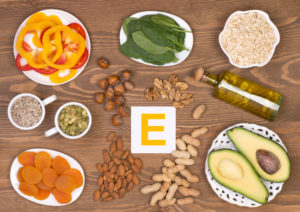 More isn’t always better, particularly if you’re trying to slow aging with vitamin E.
More isn’t always better, particularly if you’re trying to slow aging with vitamin E.
Vitamin E is a powerful antioxidant that could play a valuable role in keeping you younger. The fat-soluble vitamin can help protect cells from free radicals, potentially helping you appear younger inside and out.
Advertisement
But you don’t want to go too hard on it. Too much may cause harm.
Free radicals cause oxidation to your cells. What does that mean? It’s like when rust forms on your car. When cells are exposed to free radicals and oxidation occurs, cells can age faster.
Healthy cells are broken down, and it can contribute to skin aging, as well as an increased risk of heart disease and more. Free radicals beat down on your cells.
Vitamin E can neutralize free radicals and slow this process. There is some evidence to show that when applied topically, for example, vitamin E may reduce skin cell damage by making it more resistant to UV rays.
There is also evidence suggesting vitamin E can help keep the immune system strong.
It’s rather unlikely for a person to be vitamin E deficient. It’s found in a host of foods including:
- Vegetable oils
- Nuts
- Seeds
- Leafy green vegetables
- Cruciferous vegetables
- Avocado
- Shrimp
- Trout
- Kiwi
Advertisement
Supplementation is where things get tricky for vitamin E. Taking high doses of vitamin E supplements can cause serious side effects, including hemorrhagic stroke. Therefore, it’s best to avoid supplementing too much for anti-aging.
If you decide to use a supplement, don’t take more than 1,000 mg per day. Even still, you should talk to your doctor before using these products to promote benefits.
It’s possible that eating more vitamin E can help your body fight back against molecules that cause premature aging. With a healthy diet and lifestyle, you might be able to delay aging as well as anybody.
